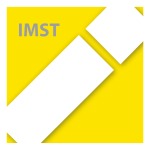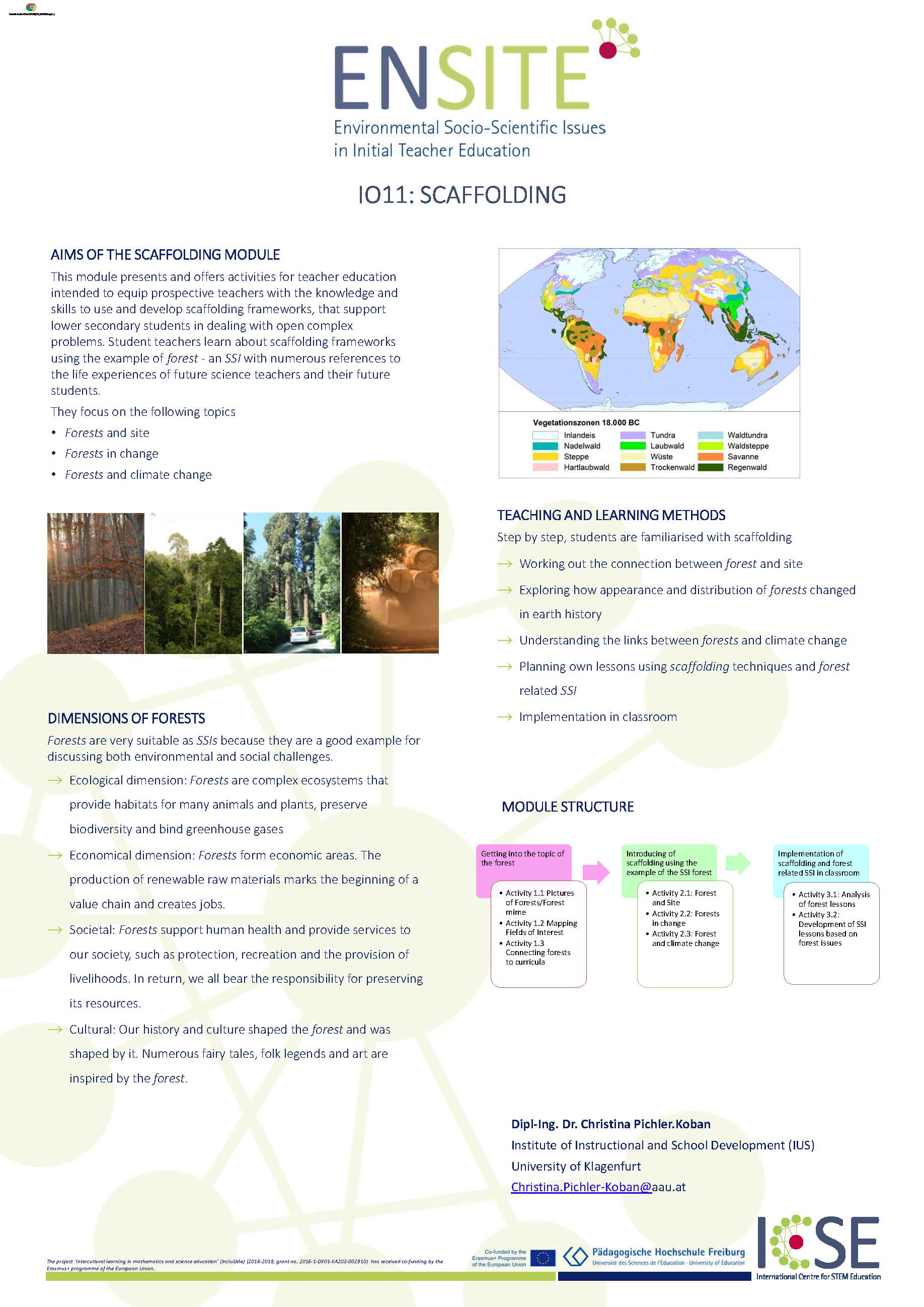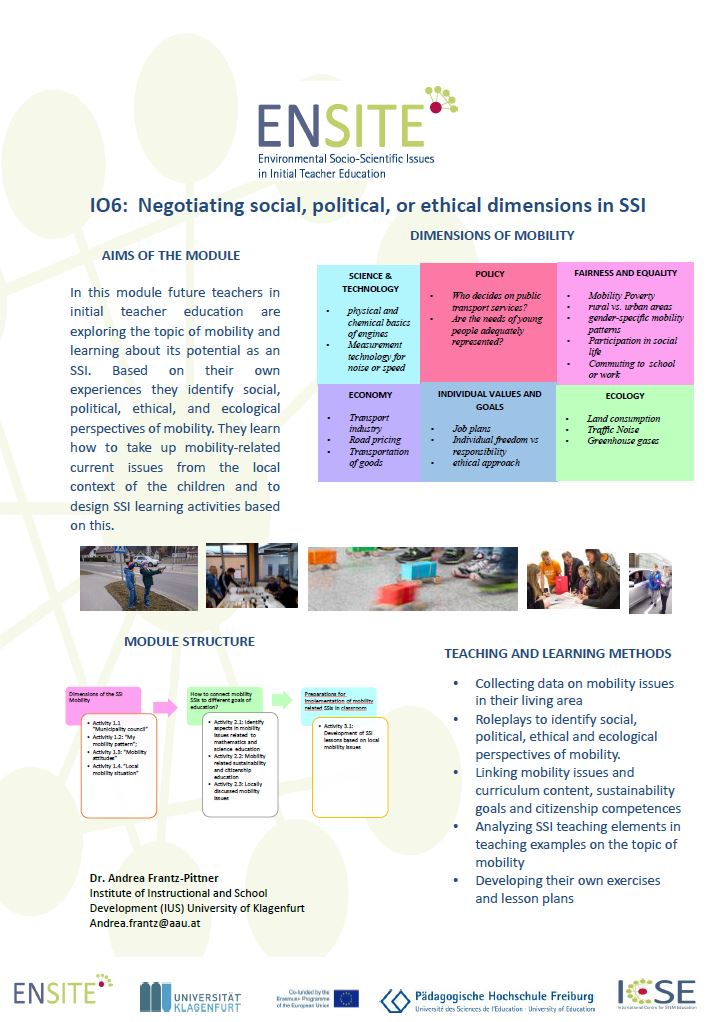Aktuelle Projekte:
Team:
Dr. Thomas Pletschko (Projektleiter) Clarissa Zillner MSc MA , Mag. Martin Röhsner, Sabrina Sakrowsky BA, Philipp Röhsner BSc, Gerda Rockenbauer MA
Team:
Based on research investigating the skills development of teachers, an online counselling programme for planning the teaching career is developed, evaluated and adapted within the scope of an international cooperation arrangement. It includes information texts about the teaching profession, reports from everyday school life, and self-exploration techniques to aid the individual in the assessment of personal interest in and potential for a variety of functions in the educational sector (e.g. as teacher, administrator or teacher trainer). In addition to these offers aimed at the target group comprising teachers, CCT also provides special tools for professionals, who hope to use the programme for the purposes of counselling, teacher training, or research.
Further information about CCT is available at: http://www.cct-austria.at/
Team:
Team:
Stefan Pasterk (Projektleiter, Universität Klagenfurt) Andreas Bollin (Antragsteller, wissenschaftlicher Mitarbeiter, Universität Klagenfurt)
Integrative Study of Momentary Learning in Context. (EARLI: Emerging Field Goal) Project
The purpose of the emerging field group (EFG) is to construct an integrated perspective on how children learn in classrooms in momentary time, using expertise from across SIGS 3 (conceptual change), 8 (motivation and emotion), and 16 (metacognition). This integrated perspective will expedite a conceptual and methodological advance in studying learning in complex real-world settings. A focus on momentary learning in context is needed to help researchers provide teachers with information of practical use for coordinating and promoting children’s learning in classrooms.
Funded by the Jacobs Foundation, funds administered by the governing body of EARLI (https://www.earli.org/efg).
Team:
Jennifer Symonds (University College Dublin)

IMST is a flexible support system. The aim is to support teachers in the implementation of innovations in MINDT instruction (German abbreviation for Mathematics, Informatics, Natural Science, German, Technology) at Austrian schools. IMST uses two support approaches: topic-specific support and support in regional networks.
The solution approach of IMST consists of scientists accompanying teachers in their endeavours to improve instruction. Networks serve as places of exchange, where teachers and teacher trainers can communicate their experiences of instruction and school. IMST has an impact on the individual instruction, and also on the structures in the educational sphere: teachers carry out innovative instructional and school projects and collaborate in networks. At the same time, IMST offers much more: University Colleges of Teacher Education and Universities work together closely in the thematic programmes. Representatives of the State Educational Boards also participate in the networks. Thus, apart from long-term structural discussions, stable cooperation arrangements can be established, providing access to the benefits of synergies within the education system.
Further information is available at http://www.imst.ac.at
Team:
Konrad Krainer (Projektleitung)
Franz Rauch (Stellvertretende Projektleitung)
Heimo Senger (Stellvertretende Projektleitung)
Building on earlier own studies and on results gained by other researchers, we explore which classroom management strategies produce which consequences under which conditions. The conditions considered include the characteristics of the acting teachers (e.g. their personality structure) and of the pupils or classes (e.g. their performance level), as well as of the context (e.g. the subject being taught or the type of school). Research efforts aim at producing fundamental insights about the field of research on the one hand, and at the development of offers of support (e.g. diagnostic tools) for teachers, who wish to further enhance their skills in classroom management, on the other hand.
Further information is available at Classroom Management
Team:
Ferdinand Eder (Uni Salzburg), Georg Krammer (Uni Linz), Gerlinde Lenske (Uni Lüneburg), Barbara Pflanzl (PH Steiermark), Elisabeth Seethaler (PH Salzburg)
Teacher Motivation (German abbreviation LeMo) – This project investigates the conditions and effects of teacher motivation: The research project addresses the conditions and effects of both pupils and teachers. Moreover, the correlation of the qualities of the professional motivation of teachers and lesson planning as well as the learning motivation of pupils is explored. Standardised survey instruments have been continuously deployed since 2006, in order to question several thousand pupils and their teachers.
Team:
Team:
Universität Augsburg (PD Dr. Sonja Bieg); Universität Bielefeld (Prof. Matthias Wilde, Dr. Nadine Großmann); Universität Innsbruck (Dr. Ann-Kathrin Dittrich); Pädagogische Hochschule Kärnten (Dr. Almut Thomas); Universität Osnabrück (Dr. Alexander Eckes); Universität Salzburg (a.Prof. Daniela Martinek, Mag. Matteo Carmignola)
This key research area involves the analysis of learning motivation and interest in diverse learning settings. As such, individual learning conditions and learning environments are examined in conjunction with learning motivation and thematic interest.
Research questions include:
Which learning environment conditions motivate learners?
What demotivates pupils, students or teachers?
How is the teachers’ motivation to work linked to the pupils’ motivation to learn?
Why are certain learners more successful at remaining motivated and interested in the long term?
What influence does personality exert upon the learning motivation and the perception of learning environments?
Which cultural differences can be identified?
Theoretical concepts (a brief overview)
Two conceptually closely related theories form the basis of the research area:
The Self-Determination Theory (SDT) (Deci & Ryan, 2002) and the pedagogical-psychological Interest Theory (Krapp, 1992). It is assumed that, amongst others, the satisfaction of the basic psychological need for autonomy, skills, and social inclusion promotes self-determined learning motivation and thematic interest in the long term. Scholars also study the extent to which aspects of a constructivist teaching-learning philosophy are interlinked with (self-determined) motivation and interest. Additionally, on the level of the individual, personality traits and attitudes relevant to learning are collected and analysed in the context of the perception of the learning environment, as well as the motivation and the interest.
Areas of interest
Student learning at university, learning in school instruction, conditions and impacts of the teachers’ motivation to work.
Instruments
An instrument used to record the motivational regulation amongst pupils was revised for German-speaking countries. The questionnaire is an adapted and extended version of the “Academic Self-Regulation Questionnaire” (SRQ-A) following Ryan & Connell (1989). Test-statistical parameters as well as preliminary studies on the validity indicate the good applicability of the instrument for instructional research and practice. A revised version of the questionnaire has been available since 2011.
Furthermore, a questionnaire was developed, which comprises the perceived support of the three basic needs as well as the scales for structure and “giving a rational” in classroom instruction.
Additional questionnaires addressing the (learning) motivation and the determination of conditions relevant to motivation (e.g. teacher and student questionnaires) are available from the authors: Florian.Mueller [ÄT] aau.at
Available questionnaires
SRQ-A[G]-2007: Scales for motivational regulation for learning by pupils (research report No. 1)
SRQ-A[G]-2011: Scales for motivational regulation for learning by pupils (research report No. 5)
SBN-S-2011: Scales for perceived basic needs support of pupils
SMR-L-2015: Scales for motivational regulation for learning (diagnostics)
Team:
 The aim of the ÖKOLOG (German abbreviation) Programme is to make schools and University Colleges of Teacher Education (German abbreviation: PH) more ecological. Environmental education is firmly embedded as part of the school programme. With 450 ÖKOLOG schools at all school levels and 6 ÖKOLOG Colleges of Teacher Education, it is the largest network for school and the environment in Austria today. For the past 15 years, ÖKOLOG schools and Colleges of Teacher Education have been delivering an important contribution to sustainability education and to school development in Austria. ÖKOLOG intends to encourage and motivate schools to further increase their activities in a variety of action areas (e.g. energy, water, waste, health, school climate, social issues and values). This not only involves the realisation of numerous projects revolving around the topic of sustainability, but also represents the endeavour to establish a sustainable structure. Working in collaboration with the Austrian Federal Ministry of Education and Women’s Affairs (BMBF), the IUS has been responsible for coordinating the ÖKOLOG Programme and Network since March 2015.
The aim of the ÖKOLOG (German abbreviation) Programme is to make schools and University Colleges of Teacher Education (German abbreviation: PH) more ecological. Environmental education is firmly embedded as part of the school programme. With 450 ÖKOLOG schools at all school levels and 6 ÖKOLOG Colleges of Teacher Education, it is the largest network for school and the environment in Austria today. For the past 15 years, ÖKOLOG schools and Colleges of Teacher Education have been delivering an important contribution to sustainability education and to school development in Austria. ÖKOLOG intends to encourage and motivate schools to further increase their activities in a variety of action areas (e.g. energy, water, waste, health, school climate, social issues and values). This not only involves the realisation of numerous projects revolving around the topic of sustainability, but also represents the endeavour to establish a sustainable structure. Working in collaboration with the Austrian Federal Ministry of Education and Women’s Affairs (BMBF), the IUS has been responsible for coordinating the ÖKOLOG Programme and Network since March 2015.
Further information is available at http://www.oekolog.at/
Team:
The main objective of this quantitative project is to gain insights into the extent to which the results reported back to schools from the standardised evaluations of level of learning find their way into specific measures implemented by school administrations aimed at quality assurance.
Furthermore, the project aims to investigate which consequences these measures of the school administrations yield in the schools, and which effects can be observed in the results of a school in subsequent learning level evaluations.
Team:
Team:
PH Wien, KPH Wien/Krems, PH Niederösterreich, PH Oberösterreich, PPH der Diözese Linz, PH Salzburg, PH Tirol, KPH Edith Stein, PH Vorarlberg, PH Kärnten, PH Steiermark, KPH Graz, PH Burgenland
This accompanying research aims to achieve the following objectives: to be able to give an account of the university certificate programmes, to identify approaches for the improvement of the design of these and similar programmes, to gain generalizable knowledge about the efficacy of teacher education, and to create and further develop survey procedures, which can also be applied in other studies concerning teacher education. The research follows a longitudinal design, taking into account the input, the ongoing processes, and the output of the programmes. This is carried out against the theoretical background of a so-called offer-utilisation-model. Using online surveys, participants are questioned about their admission prerequisites, the perceived learning opportunities and their utilisation, as well as their skills development. In order to obtain “objective” indications alongside the self-assessments of the participants regarding the effect of the further education, additional measures include the use of a video lesson sequence at the beginning and at the end of the programme, which the participants analyse according to didactic considerations. The accompanying scientific research is financed from the budget provided for the university certificate programmes.
Team:
Abgeschlossene Projekte:
Team:
Richard Kromp Filippina Risopoulos Christian Rammel Robert Sposato
Team:
Katharina Ingrid Gölly Matias Tikvic Christian Fazekas Franziska Matzer
ENSITE (ENvironmental Socio-Scientific Issues in Initial Teacher Education) supports the development of future science and maths (from now on referred to as science) teachers’ environmental citizenship and related teaching competences.
 |  |
Team:

During the term of the project (2014–2017), PARRISE intends to contribute to the development of a scientifically educated society, whose citizens participate in research and innovation processes (Responsible Research and Innovation – RRI). It is hoped that this will succeed by the application of two educational approaches, which are often taught independently of one another in schools: Inquiry-Based Science Education (IBSE) and Socio-Scientific Issues-Based Learning (SSI). This integrative approach is called Socio-Scientific Inquiry-Based Learning (SSIBL).
PARRISE aims to develop materials, tools, and in- and pre-service professionalization courses for Natural Science teachers, based on the SSIBL approach and on the established best practice of the project partners. Tried and tested practices will be reflected with a view to the RRI approach, and will be developed further by an international “community of learners”, which has already integrated RRI into its teaching and learning processes. Accordingly, a multidisciplinary team as well as network activities between teachers, teacher trainers and educational researchers will be developed. As one of 18 project partners, the IUS will contribute to the development of teaching materials and the professionalization of teachers.
Further information is available at http://www.parrise.eu/home
Team:
Team:
Robert Gennaro Sposato Wilfried Elmenreich Franzisca Weder Stefanie Mertl Denise Voci
Erfolgreiche schulische Bildungsprozesse sind – neben den Lernvoraussetzungen von Schüler/innen – insbesondere auch vom Handeln der Lehrer/innen und damit auch von deren kognitiven und nicht-kognitiven Handlungsdispositionen abhängig. Damit kommt der Auswahl von Personen für Lehramtsstudien eine zentrale Rolle zu. Neben geeigneten Attrahierungsstrategien und einer wirkungsvollen Lehrer/innenausbildung lassen sich für den Lehrer/innenberuf geeignete Personen vor allem durch Maßnahmen der Selbst- und der Fremdselektion rekrutieren. Das österreichweite Kooperationsprojekt entwickelt neues dreistufiges, theoretisch und empirisch fundiertes Verfahren zur Auswahl von Lehramtsstudierenden, welches für den Einsatz an österreichischen Universitäten und Pädagogischen Hochschulen konzipiert wird, wobei grundlegende Konzepte und Befunde der Lehrer/innenbildungsforschung und der psychologischen Eignungsdiagnostik, im Speziellen der Personalauswahl, Berücksichtigung finden. Das dreistufige Verfahren besteht aus (1.) einem nicht-selektiven Self-Assessment Verfahren, welches eine Selbsterkundung auf Basis von motivationalen, persönlichkeitsstrukturellen und biografischen Merkmalen ermöglicht und umfangreiche Informationen zum Lehrer/innenberuf bereitstellt. (2.) werden durch standardisierte psychologische Tests allgemeine kognitive Funktionen, sprachliche, emotionale und kreativitätsbezogene Kompetenzen sowie ausgewählte Persönlichkeitsmerkmale erfasst. (3.) In einem Face-to-Face-Assessment werden auf standardisierte Weise verbale und nonverbale Kommunikationsfähigkeit, kognitive Entscheidungsfähigkeit und Selbstreflexionskompetenz ermittelt. TESAT evaluiert das Verfahren und baut ab 2015 eine umfassende Längsschnittstudie auf, die neben ausbildungsbezogenen Kriterien aus Studium und Praktikum auch Erfolgskriterien der Tätigkeit im Lehrer/innenberuf erfassen soll.
Team:
Aljoscha Neubauer, Georg Krammer, Corinna Koschmieder, Barbara Pflanzl, Jürgen Presch, Hubert Schau
Team:
Daniel Barben; Paula Brezovec; Wilfried Elmenreich; Nina Hampl; Robert Gennaro Sposato; Kirsten von Elverfeldt; Bettina Gruber; Hans Karl Peterlini; Anke Uhlenwinkel; Martina Ukowitz; Jonas Moremi Zeil; Norbert Wohlgemuth; Max-Peter Menzel; Peter Mandl; Christoph Klemenjak; Horst Kanzian; Ekanki Sharma

